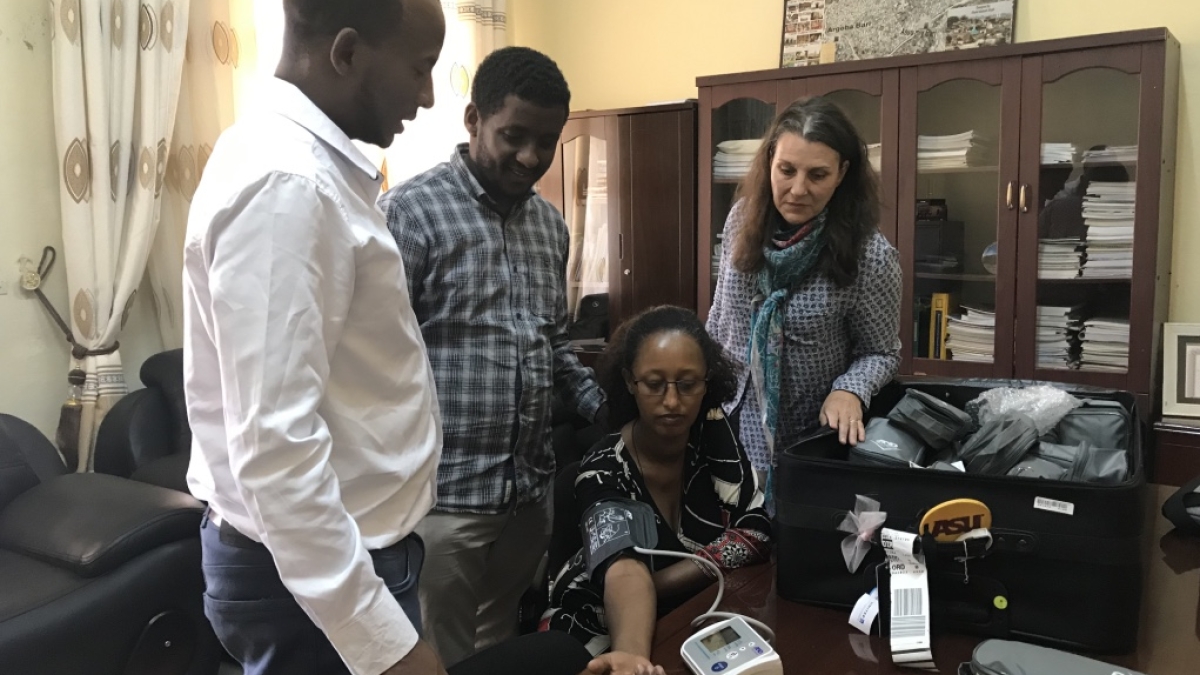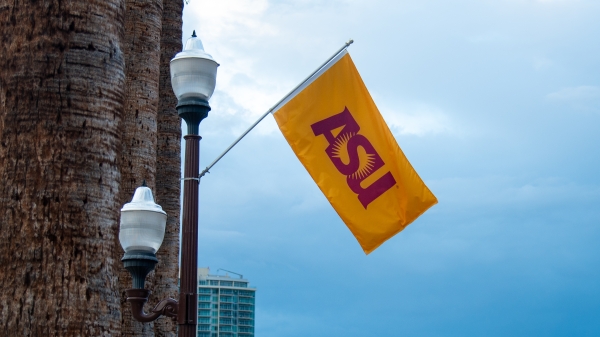ASU anthropologist recognized for acclaimed work in human biology

One of ASU Regents and President's Professor Alexandra Brewis’ (far right) recent collaborations has been with nutritionists and public health researchers at Haramaya University in Ethiopia, examining the connections between mental health and water use in smallholder farming households. Brewis and her team are testing blood pressure monitors in preparation for a survey of over 4,000 households. Photo courtesy Alexandra Brewis
From ethnographic fieldwork to research on weight stigma and water insecurity, Arizona State University Regents and President's Professor Alexandra Brewis is prominent in the world of anthropology and human biology.
For her work in these fields, the anthropologist was recently awarded the Franz Boas Distinguished Achievement Award from the Human Biology Association. This lifetime achievement is given out annually to one member of the scientific nonprofit association.
According to the association's website, "The Franz Boas Distinguished Achievement Award honors members of the association for exemplary contributions to human biology in science, scholarship and other professional service."
This year, Brewis was also one of four professors chosen for the prestigious title of Regents Professor — the highest faculty honor awarded at Arizona State University — for her work as a biocultural anthropologist.
Among her numerous awards and recognitions, Brewis is a fellow of the American Association for the Advancement of Science (AAAS) and a recipient of the Conrad M. Arensberg Award of the American Anthropological Association, which honors an individual who has furthered anthropology as a natural science.
ASU News spoke with Brewis about the Franz Boas Award and her work in human biology.
Question: What does it mean to you to be honored with the 2024 Franz Boas Distinguished Achievement Award?
Answer: The Human Biology Association has always been a very special professional organization to me. I first started attending their conference meetings decades ago. My first conference was in San Diego in 1989, when I had just come to the United States from New Zealand, young and eager to learn, but also knowing little about how academics worked.
I was welcomed into a society of scholars from so many disciplines — including medicine, nutrition, genetics and anthropology — and from all over the world, together advancing innovative research and teaching on how humans vary, and when and how that variation matters.
The association makes important contributions connecting biology to culture and society — looking at both how human biology reflects social inequalities but also ensuring human biological research is shared in ways that are maximized for public good. This is one reason it isn’t a society solely focused on scholarship, but also on innovating how science is translated into application and human biology is taught.
The society has always been explicit about its goals to support students as emerging scholars in human biology, which is what drew me in to the association, but also what gives me great joy as a more senior scholar now able to give the same necessary support to students that was given to me at the start of my career, and it was a privilege to recently serve as its president.
Q: What do you enjoy about your research and life work that contributes to human biology?
A: The joy of my career as an anthropologist doing human biology has been that there are few definite boundaries to what one can study or how it can be studied.
In more traditional disciplines, you aren’t allowed to constantly rewrite the rules about what is worthy or important research, or what is the “right” way to do it. Human biologists range across all aspects of the human experience — linking genetic, epigenetics and the study of human behavior with theories and tools from anthropology that capture how humans understand the world around them.
Human biology has meant that I have been able to shift what I research and how I research it so many times across my career. I began my research career using tools from endocrinology to understand human reproduction, switched to doing detailed long-term ethnographic fieldwork in Micronesia to study family planning, then did classroom observation of child behavior in Mexico and the U.S. to understand psychiatric diagnosis.
In the last 15 years, I have been integrating multiple methods from the natural and the social sciences in multiple different locations — in places like Samoa, in bariatric clinics, in online communities — to understand what shapes body weight, but how reactions to body weight shape us as social beings such as through stigma. Similarly, I have been engaged for a number of years in an array of work around water insecurity as a similar biocultural challenge, which has me currently ranging across Arizona interviewing people without ready access to plumbing.
Human biologists can easily understand how all these lines of research fit together. My varied career — working in so many places and on different topics — makes sense to them. It allows me to continue to chase new leads and learn and deploy new methods for how to unravel what makes us human. And our “normal” human biologies are constantly changing and we need equally flexible ways to understand how that happens and what it means.
I have to say, with the new generation of weight loss drugs becoming available, there is a huge change around the body on the horizon, but also the social meanings and implications of body weight will shift as well. But what I really love about human biology is that it is ultimately about the complexities of being human, and that has to be the most interesting problem to be working on. Decades on, I find people utterly fascinating. Doing projects on complex problems like weight and water insecurity allows me to collaborate with communities, practitioners and scholars from many different backgrounds in ways that constantly expose me to new ways of thinking and ways of doing science.
More University news

ASU names 3 Regents Professors for 2025
Three Arizona State University professors are being honored with the highest faculty award possible — Regents Professor.The three are internationally recognized experts at the top of their fields,…

Lester Godsey joins ASU as chief information security officer
With a career spanning nearly three decades of professional IT experience, Lester Godsey is back where he first started — serving the community at Arizona State University.As a two-time ASU alum,…

ASU a top-ranked university for graduate employability
Students usually seek higher education degrees to build their skills and aptitude in their chosen vocation, and advance their life opportunities. And Arizona State University is a good place to do…